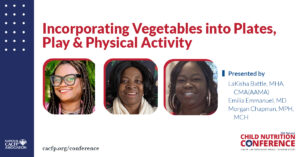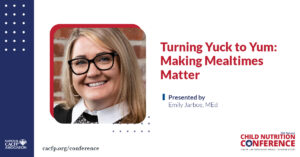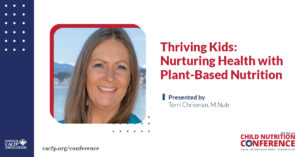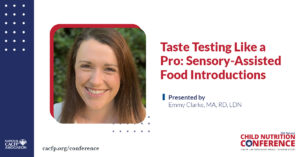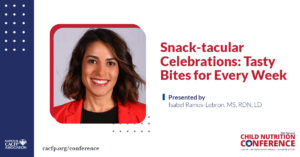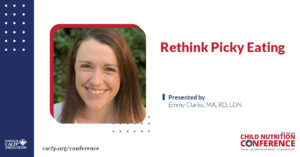2025 Nutrition Education
April Virtual Events
Back to Blog Back to Blog April Virtual Events April 1, 2025 We’re only two weeks away from the National Child Nutrition Conference in Dallas, TX. No April Fool’s pranks here! Before we see you in Dallas though, be sure to catch our next webinar on “Supporting Autism in Early Childhood Settings”. After this we…
Read MoreIncorporating Fresh Vegetables into Plates, Play & Physical Activity
Vegetables are not inherently exciting to children. Gain tips and resources for introducing veggie variations on the plate in a fun, playful way while fostering physical activity through gardening and harvesting techniques. Learn how to leverage community partners, outsource with local produce producers, and create backyard gardens to increase access to healthy food sources.
Read MoreGPS: Engaging Grandparents, Parents & Students in Farm to Table
Curiosity about where food comes from and how to access the healthiest choices available is common, regardless of age. Learn how to engage everyone in the process including seed to farm, farm to table, and cup to table.
Read MoreReligious Dietary Basics: Serving Halal & Kosher
Meeting parent preferences for special dietary or allergies is something we all do and understand. But when it comes to meeting religious dietary restrictions, are we doing enough? Whether it’s Halal, Kosher, or some other religious-based need, learn how to understand and best serve these diverse communities.
Read MoreWords Matter: Empower and Motivate Health with Facts
Nutrition is a multi-billion dollar industry with no shortage of information available to the average person. Unfortunately, not all of that information is factual or helpful. Learn ways to effectively provide factual and empowering nutrition messages at your facilities that can make lasting positive change.
Read MoreTurning Yuck to Yum: Making Mealtimes Matter
Introducing children to a variety of foods promotes positive eating habits, and supports growth, development, and positive nutrition. They are more likely to have a diverse, balanced diet later in life when introduced to assorted foods, tastes, and textures in weaning and early childhood. Explore factors affecting children when trying new foods and strategies educators can use to break barriers.
Read MoreThriving Kids: Nurturing Health with Plant-Based Nutrition
Why are more and more countries recommending plant-based nutrition in their national guidelines? Plants provide exceptional nutrition without the added cholesterol, saturated fats, flavors, colors, hormones, or medications that can be found in animal products. Learn to dispel myths surrounding plant-based nutrition to get kids excited about eating meatless meals.
Read MoreTaste Testing Like a Pro: Sensory-Assisted Food Introductions
Does it seem like the children in your program enjoy learning about vegetables more than they like eating them? Maybe the way they are learning about new foods isn’t preparing them to eat them. Learn ways in which you can offer nutrition education proven to help children eat new vegetables and fruits and how you can make taste tests part of your program’s routine.
Read MoreSnack-tacular Celebrations: Tasty Bites for Every Week
Take a fun and flavorful journey that will spark your creativity in developing easy, nutritious snacks. Celebrate every day with a new snack idea. Come hungry for ideas and leave with a snack resource to help you serve a variety of foods to those in your care.
Read MoreRethink Picky Eating
Could “picky eating” be reframed in a more positive, productive way? Examine the concept of “cautious eating” and explore how this reframe can help children and their caregivers approach food differently. Hear evidence-based practices for developing positive relationships with food, how to support extreme selective eating, and what authoritative feeding means.
Read More

